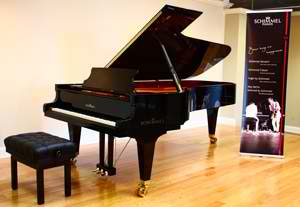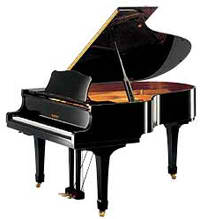
Size
An upright piano can’t house the longer strings that a grand piano can. Grands are 6 to 10 ft long compared to upright pianos which usually range from 4 to 5 ft. The grand’s larger cabinet accommodates the longer strings that allow for lower vibrations.
Balanced Sound
A hardwood soundboard (or speaker) reflects the tones coming from the strings outward so they’re amplified. Uprights focus the sound out toward the wall. So, only grands achieve that classic full, solo voice.
Beauty and High-Quality Materials
Their large size and shiny exterior alone command the attention of an audience, but their innards are exemplary, too. Some companies handcraft their pianos which means a year may go by until the piano is finished. Since the grand consists of several thousand parts, other manufacturers mass produce theirs. However, each piano needs the intervention and expertise of human hands at some point of the building process.
The various parts in the grand may be made of some of these materials:
- Hard maple
- Mahogany
- Sitka spruce
- Sugar pine
- Yellow birch
- Yellow poplar
- Black walnut
- Steel
- Iron
- Cloth and felt
The grand piano is an exquisite instrument, but it comes with that expensive price tag (upwards of $5,000). Honestly, is it worth the cost? Its longevity is renowned and, in most cases, basic maintenance will keep your beauty in tip-top shape.
Preventative Maintenance and Longevity
Grand pianos may cost more than a vehicle. Be sure to:
- Schedule a tuning at least twice per year
- Have a full regulation performed every 2-5 years
- Avoid placing your piano direct sunlight or near fireplaces, radiators, or other items that extrude fluctuating levels of heat or humidity
- Feather dust or use specialty piano-cleaning products
- Never keep liquids on or near the piano
These musical masterpieces have the potential to be passed on through many generations of your family as their lifespans usually extend past 50 years without major repairs. The best pianos can hit the century-mark and even appreciate in monetary value. Fortunately, your grand piano purchase is a lifetime investment.
Are you considering buying a new grand piano from us or are you already enjoying the tender tones of an heirloom?







